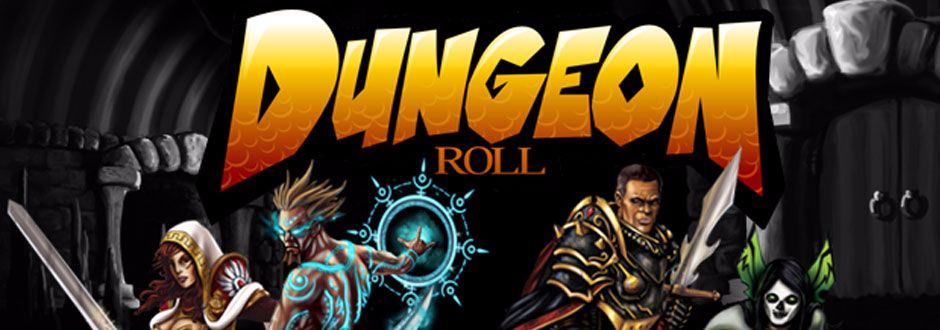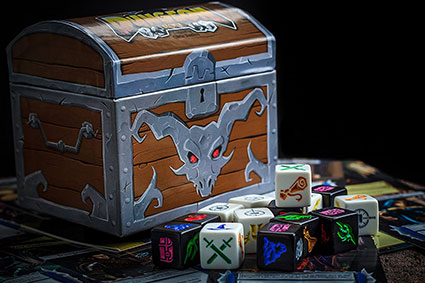Now, I have to admit, Dungeon Roll wouldn’t usually be my type of game. I’m usually somewhere growing bamboo or hiring Maids. But, I’m also a sucker for real quality components and when I was first handed the gorgeous dice for Dungeon Roll, housed in their very own dungeon chest… I was hooked.
Dungeon Roll Set-Up
As with all classic dungeon delvers, the aim of Dungeon Roll is to gain the most XP by beating the monsters and grabbing the loot. Each player chooses their hero, granting them special skills that will come in handy in the dungeon.
Once you’ve reached the heady heights of 5XP, you can level up your hero, boosting their abilities. The players take turns being the Adventurer, whilst another player acts as the Dungeon Lord.
Gameplay
The Adventurer rolls the seven Party Dice to assemble their crew, made up of Clerics, Champions, Fighters, Thieves, Mages and Scrolls, each of which have special skills to help them conquer the dangers of the dungeon.
But how do we know what these are? After the party is assembled, another player, acting as the impressively titled Dungeon Lord, rolls the Dungeon Dice to reveal the monsters (like Goblins or Oozes) and potential loot (such as Chests or Potions) which are lying in wait for our Adventurer.
The number of dice he or she rolls is equal to the current level of the dungeon they are in, which is recorded by a chunky d10. So, level one means there is only one dungeon die to contend with.
The bash then begins, faces on the party dice defeating monsters, opening chests and drinking potions as the adventurer sees fit. Once a party die has been used for a particular purpose, it is sent to graveyard and cannot be used again in this delve.
Once the Adventurer has defeated their current dungeon level, they can choose to continue to the next level of the dungeon or return to the tavern for some mead and a much needed break. As the Adventurer moves deeper into the dungeon, their party dice deplete and the number of dungeon dice being rolled increases, meaning they have less help when bashing the baddies and things become progressively difficult.
Therefore, Dungeon Roll is as much a game of calculated risk as it is sheer good luck. Retreating to the tavern while you still can means you leave with your pride and your XP in tact, lingering too long can mean that the dungeon defeats you and you leave empty handed.
Extras
It is also possible for the Dungeon Lord to roll Dragons. These are immediately sent to the Dragon’s Lair; once there are three or more dragons lying in wait, the Adventurer must face the Dragon Boss, defeating it successfully with three different members of their party.
Looting chests means treasure, useful items like Dragon’s Scales, elixirs or even additional members to add to your party. These are a one time only deal and once used, must go back into the stash. It’s a cute feature of the game that the chest shaped box is where Adventurers draw their treasure from during the game.
End of the game
Each player has three delves in which to prove their prowess. The more looting, slaying and general heroics they have performed will have earned them experience points. These, combined with the value of the remaining treasures they have, act as their final score. The Adventurer with the most points is the winner.
So, what did we think?
I loved Dungeon Roll. The game mechanic is well thought-out, easy to learn and quick to master. The components make for genuine satisfaction with every roll of the die and make for a game that will look fresh, even in 50 plays time.
I’m always on the lookout for really great two-player games and this has everything you could want. It’s easy to transport, is quick to get into and has unlimited replayability. It would stand up as a four-player, but due to the inactivity around other players turns and the lack of other player interaction, it could become tedious for some. It’s a great feature of the game that it can also be played as a single-player if you’ve got a spare 15 minutes.
Admittedly, some heroes are better than others. Whilst the Crusader transforms into the genuinely butt-kicking Paladin, capable of bashing all monsters and looting the heck out of any dungeon, the Bard does little more than help you discard dragons. Not surprising from a hero whose only weapon is his lute. Hey-ho. Not all heroes can be belters, and it isn’t detrimental to the enjoyment of the game. But saying that, I’ve never had to chuck a lute at an angry dragon.
My games are usually stored by frequency of play, and this one has definitely instituted itself in the top drawer. It came as a pleasant surprise, but this is definitely how I roll.








Share